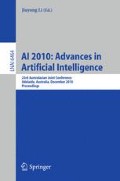Abstract
This paper describes an experimental system for knowledge acquisition based on a general framework exemplified in the game of twenty questions. A sequence of propositional questions is put to the user in an attempt to uncover some hidden concept, and the answers are used to expand and refine the system’s knowledge of the world. Previous systems adopting this framework typically represent knowledge as a matrix of truth values or weights that relate entities to attributes—such that if the hidden concept is “a bird”, for example, then the answer to a question about whether the target entity can fly is based on the extent to which “flying” is generally attributable to “a bird” as measured by the value in the matrix element indexed by the attribute-entity pair. Our system adopts a subtly different approach wherein knowledge is a measure of the extent to which answers to pairs of questions are co-dependent. Thus, knowledge about birds being able to fly is captured by the mutual information in the answers to a pair of questions like “Can it fly?” and “Is it a bird?”. We present a case that this offers a practical and epistemologically sound basis for acquiring knowledge.
Access this chapter
Tax calculation will be finalised at checkout
Purchases are for personal use only
Preview
Unable to display preview. Download preview PDF.
References
Abney, S., Collins, M., Singhal, A.: Answer extraction. In: Proceedings of ANLP 2000, Seattle, WA (May 2000)
Abramson, N.: Information Theory and Coding. McGraw-Hill, New York (1963)
Breck, E., Light, M., Mann, G.S., Riloff, E., Anand, B.B.P., Rooth, M., Thelen, M.: Looking under the hood: Tools for diagnosing your question answering engine. In: Proceedings of the Workshop on Open-Domain Question Answering, Toulouse, France (July 2001)
Harabagiu, S., Pasca, M., Maiorano, S.: Experiments with open-domain textual question answering. In: Proceedings of COLING 2000, Association for Computational Linguistics/Morgan Kaufmann, San Francisco (August 2000)
Hintikka, J.: New foundations for a theory of questions and answers. In: Kiefer, F., Karigren, H. (eds.) Questions and Answers, pp. 159–190. KVAL, Stockholm (1983)
Hintikka, J.: Knowledge-seeking by questioning. In: Dancy, J., Sosa, E. (eds.) A Companion to Epistemology, pp. 241A–244A. Basil Blackwell, Oxford (1992)
Author information
Authors and Affiliations
Editor information
Editors and Affiliations
Rights and permissions
Copyright information
© 2010 Springer-Verlag Berlin Heidelberg
About this paper
Cite this paper
Smith, T.C., van de Molen, C. (2010). Unbounded Knowledge Acquisition Based upon Mutual Information in Dependent Questions. In: Li, J. (eds) AI 2010: Advances in Artificial Intelligence. AI 2010. Lecture Notes in Computer Science(), vol 6464. Springer, Berlin, Heidelberg. https://doi.org/10.1007/978-3-642-17432-2_24
Download citation
DOI: https://doi.org/10.1007/978-3-642-17432-2_24
Publisher Name: Springer, Berlin, Heidelberg
Print ISBN: 978-3-642-17431-5
Online ISBN: 978-3-642-17432-2
eBook Packages: Computer ScienceComputer Science (R0)

